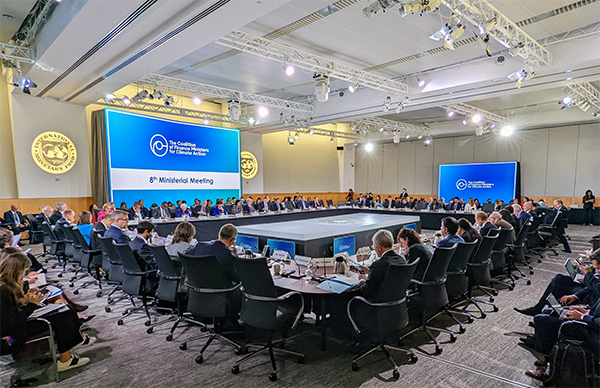New guide finds Finance Ministries can turn the tide on climate crisis

Finance Ministries hold the key to tackling climate crisis, according to a ground-breaking new guide by the Coalition of Finance Ministers for Climate Action.
The guide lays out a framework for mainstreaming climate policies into Ministries of Finance, highlighting 15 actions that “will send a strong signal that the world economy is poised to follow a low-carbon, climate-resilient path”.
The Coalition of Finance Ministers for Climate Action was created in 2019, and now has 87 members globally and 26 Institutional Partners. It brings together the world’s leading economic, fiscal, and financial policymakers in driving the global climate response and in securing a just transition towards low-carbon resilient development. The Coalition is currently co-chaired by the Finance Ministers of Indonesia and the Netherlands.
The guide on ‘Strengthening the Role of Ministries of Finance in Driving Climate Action: A Framework and Guide for Ministers and Ministries of Finance’ was prepared under the co-leadership of Finland and Rwanda, with contributions from nearly 30 Ministries of Finance, more than 70 experts and partners of the Coalition in the public, private and third sectors. The Grantham Research Institute on Climate Change and the Environment at the London School of Economics and Political Science supported the preparation of the guide as the lead Institutional Partner. The Guide was presented to Finance Ministers at the Coalition’s meeting on 14 April 2023 in Washington DC.
The guide points out: “Governments worldwide are facing an unprecedented series of crises: an economic crisis with slow growth, rising debt and challenges in recovering from COVID-19; a cost-of-living and energy crisis; and a climate crisis with ever growing impacts from climate change. Far-sighted leadership is now needed by the public and private sector to deal with these challenges concurrently and build a zero-carbon, climate-resilient economy. This future economy is firmly within the grasp of today’s leaders.”
But it warns: “Ministries of Finance need to be at the heart of driving this economic transformation: climate action will not be possible without them.”
The guide states that “climate action is essential for achieving Finance Ministers’ core priorities of macro stability, growth and responsible management of the public finances, and will bring at least four major benefits: helping to avoid escalating risks with macro-critical consequences; driving significant growth and development opportunities; creating economic, social and environmental benefits, especially for the most vulnerable members of society; and delivering clean, secure and affordable energy for all”.
It adds: “These benefits and opportunities plus the avoided costs and risks mean that climate action can help Ministers of Finance harness the development and growth story of the 21st century”.
The guide states: “While Ministries of Finance need to be proactive in their areas of direct responsibility such as reforming the tax system to accelerate the transition through carbon pricing, subsidy policies, and fiscal incentives, they also need to actively engage in supporting Ministries of Environment, Economy, Energy, Agriculture, Transport, Planning, Health and others to drive action and scale up sustainable investments”.
The framework for climate action “shows how Ministries of Finance can mainstream climate into their three typical core functions: economic strategy and vision; fiscal policies and budget management; and financial policy and regulation and oversight of the financial system”. It includes more than 140 country case studies of climate action being undertaken by Ministries of Finance around the world, to demonstrate that reforms are being implemented.
The report describes 15 “transformative actions” for Ministries of Finance that would support pathways to low carbon economy:
- Dedicated Ministry of Finance strategies and strengthened mandates for climate action.
- Building dedicated capacity for climate action.
- Active engagement in inter-agency and stakeholder coordination efforts.
- Investing in skills and expertise.
- Revamping economic tools, data and decision-making approaches.
- Introducing fiscal policies to transform macroeconomic incentives for climate action.
- Using the budget and public financial management to drive transformation in all sectors of the economy.
- Redesigning the tax system for net zero and climate resilience.
- Raising, steering and blending finance for investment at unprecedented speed and scale.
- Leveraging international climate finance.
- Mainstreaming climate action into national growth and development strategies.
- Active engagement in national climate strategies.
- Developing sustainable, inclusive and resilient investment strategies.
- Driving the green transformation of state-owned enterprises, national development banks, and sovereign wealth funds in cooperation with central banks.
- Developing just transition plans and policies.
In the Foreword to the report, Pekka Morén and Masyita Crystallin, the Sherpas to the Coalition for the Finance Ministries of, respectively, Finland and Indonesia, write: “Taking on an enhanced role, as recommended in the guide, can only happen if Ministries of Finance can clearly articulate their core tasks and responsibilities at the national level, strengthen their mandates to drive climate action, and introduce this role into national climate governance frameworks. Without such mandates, the necessary resources and expertise might be difficult to acquire.”
-ENDS-

